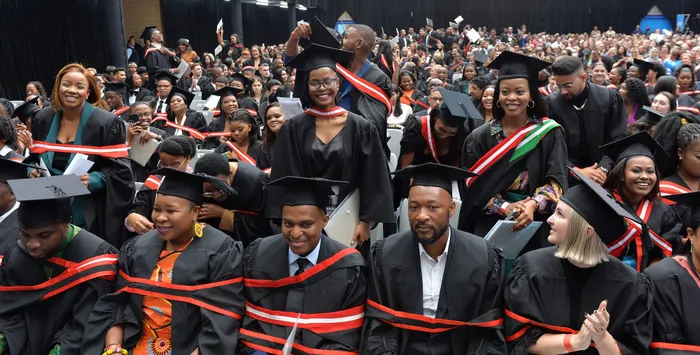Africa’s education level increase remarkable, expert says

Picture: Phando Jikelo/African News Agency ( ANA )/Taken April 19, 2023 – Cape Peninsula University of Technology students in the Informatics and Design Faculty graduated today. A number of PHD from this faculty, some who graduated summa cum laude, were on stage to be honoured by the Vice Chancellor Chris Nhlapho. Earlier this year, Rector Viktor Sadovnichy from Moscow State University proposed the creation of an association of universities of Russia and Africa to boost co-operation between the academic circles of African nations and Russia. Moreover, Russia has recently increased the number of African students who can study in its universities, the writer says.
By Gleb Chugunov
The level of education in Africa has significantly increased in recent years, prompting the transformation of African economies and enhancing the investment attractiveness of the Continent, Denis Zhiltsov, project manager for information support of the second Russia–Africa Summit, told Sputnik.
“For African students, the opportunity to receive a quality education in their home country is not only a matter of ‘social elevators’, national pride or prestige. It is, above all, a question of the prospects for further development of the Continent’s economies, and the transformation of African countries into high-tech societies that are not just integrated into the global agenda, but also influence it,” Zhiltsov said.
Co-operation in education will be one of the key topics of the second Russia-Africa Summit and economic and humanitarian forum, to be held in St Petersburg on July 26-29, 2023.
The first such summit was held in Sochi in 2019 and resulted in the outline of a set of goals and objectives for the development of co-operation between Russia and Africa in the fields of politics, security, economics, science, technology, culture and the humanitarian field.
The expert also added that for Russia, in turn, interaction with African specialists, whose level of education obtained in their native countries has significantly increased in recent years, is a “solid basis for business co-operation and investment attractiveness of projects implemented in Africa”.
Earlier, experts from the World Economic Forum (WEF) drew attention to the remarkable transformation in African education: the total number of African universities in the World University Rankings in 2023 increased to 97 from 71 a year earlier. Five years ago there were only 27 on the list.
Recently, Russia’s Foreign Minister Sergey Lavrov toured Africa. Meeting with leaders of the Continent, among other things, he touched upon the possibility for enhancing co-operation with the countries of the Continent.
During a press conference in Angola, the minister noted that the humanitarian sphere is a high priority, outlining that Russia has decided to double the number of scholarships it awards to Angolans.
“We positively assessed co-operation in the humanitarian sphere, especially in education. There is a high interest in the Russian language in Angola. In this regard, we have increased the quota from 150 scholarships this academic year to 300 next year,” he said.
During Lavrov’s visit to Eswatini, the country’s foreign minister Thuli Dladla announced that the two countries are also developing ties in the educational field, as Russia has agreed to increase the annual number of scholarships for Eswatinian students to 25 from 10.
This article was first published on Sputnik